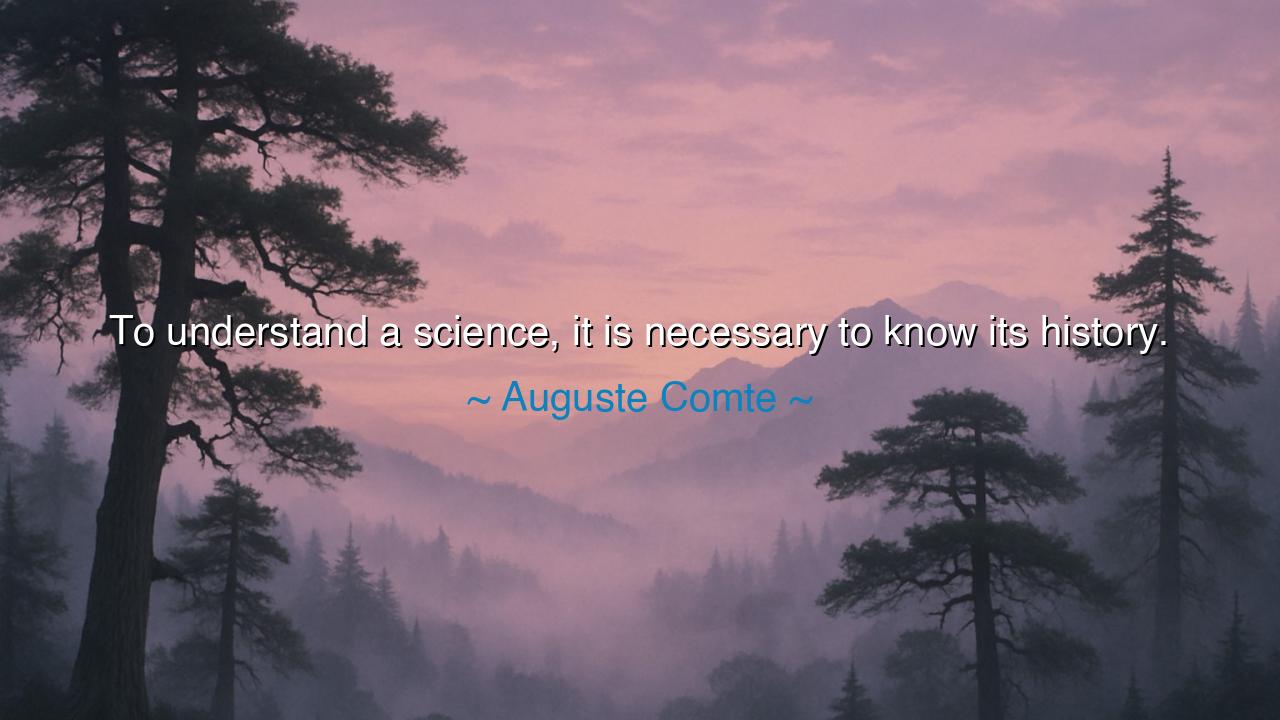
To understand a science, it is necessary to know its history.






Hearken, O seekers of knowledge, and attend the words of Auguste Comte, the philosopher of the human sciences, who proclaimed with clarity and depth: “To understand a science, it is necessary to know its history.” In these words lies a profound truth: that wisdom is not born in isolation, nor does understanding spring fully formed from the mind of the present. Rather, to grasp the essence of any field of inquiry, one must traverse the paths trodden by those who came before, and behold the struggles, errors, and triumphs that shaped its evolution.
Comte, the father of positivism, saw in the study of history the key to the comprehension of knowledge itself. The sciences, whether of matter, mind, or society, are not simply collections of facts or theorems; they are living traditions, growing through discovery, correction, and debate. To ignore history is to wander blindly, severed from the roots that nourish understanding. He teaches that every formula, every law, every insight is the culmination of a long journey of human inquiry, marked by curiosity, failure, and relentless pursuit of truth.
Consider the science of medicine. The humors of Hippocrates guided physicians for centuries, and though modern knowledge has surpassed their theories, the foundations they laid shaped the methods, the careful observation, and the ethical frameworks of healing. To study medicine without knowing its history is to risk repeating mistakes, to misunderstand the principles that underlie modern practice. The evolution of medical knowledge—from Galen to Pasteur to modern immunology—illustrates Comte’s wisdom: each advance is built upon the lessons of the past.
The history of physics provides another luminous example. Galileo, peering through his telescope, challenged the certainties of his time; Newton, meditating under an apple tree, synthesized centuries of observation into universal law; Einstein, confronting the limits of space and time, reshaped our understanding of the cosmos. Each mind built upon the shoulders of giants, and each discovery is inseparable from the lineage of thought that preceded it. To know physics without its history is to glimpse a star without understanding the constellation that gives it context.
Comte’s teaching is also a moral lesson for seekers of wisdom: humility accompanies knowledge. To understand a science is to recognize that your insights are part of a continuum, not isolated sparks of genius. History tempers arrogance and cultivates respect for the minds and hands that paved the way. It reminds us that science is not merely about answers, but about the journey of inquiry, the collective labor of countless souls across generations.
From this insight flows practical guidance: in your study, trace the paths of discovery. Read the manuscripts, understand the debates, and observe the missteps that shaped the evolution of thought. In mathematics, follow the proofs that were challenged and refined; in chemistry, observe the experiments that failed before success; in social science, examine the theories that illuminated society, and those that misled it. In every field, history is the lantern that illuminates understanding, guiding the seeker beyond mere memorization toward true comprehension.
The lesson extends beyond the sciences themselves: it is a call to understand the world as it has been shaped by human inquiry and effort. History is not merely an account of past events; it is the living thread that connects ideas, discoveries, and civilizations. By honoring the past, we honor the labor of intellect, and in doing so, we empower ourselves to extend that labor into new realms, advancing knowledge with the wisdom of those who came before.
Thus, remember: to master a science, to grasp its depths and see its contours, one must immerse oneself in its history. Auguste Comte’s words are a summons to patience, humility, and reverence: the truths we seek are built upon the foundations of the past, and to walk boldly into the future of knowledge, we must first understand the paths that history has laid before us.
If you wish, I can also craft a more dramatic, audio-ready version, vividly tracing the stories of Galileo, Newton, Pasteur, and others, making Comte’s insight come alive with emotion and historical drama. Do you want me to do that next?






AAdministratorAdministrator
Welcome, honored guests. Please leave a comment, we will respond soon